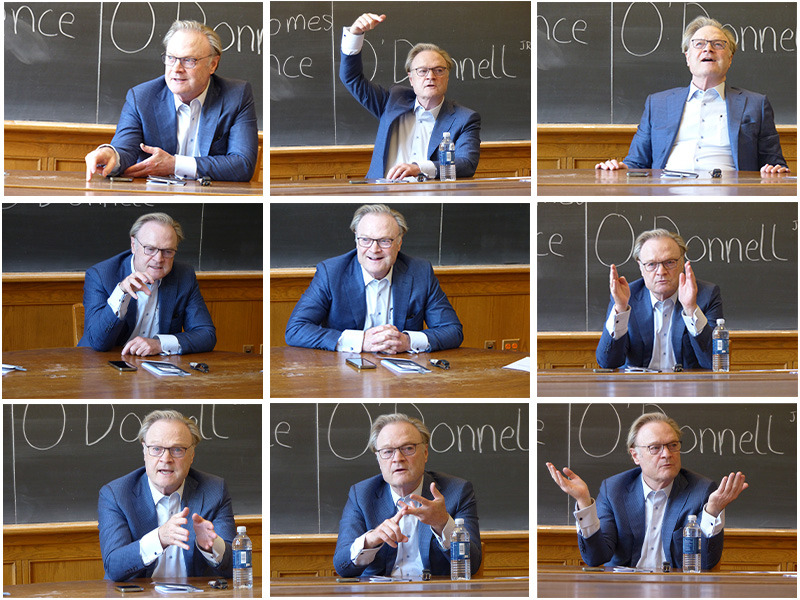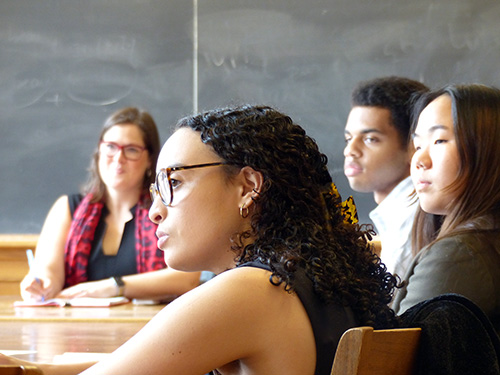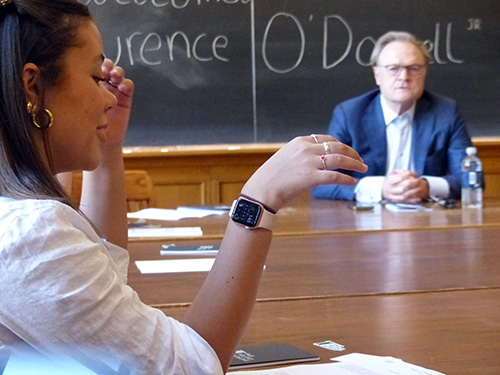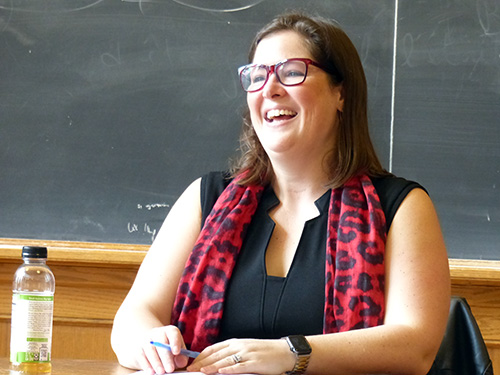Political Insiders Share Knowledge with Yale Students: ISPS Sponsors Off-the-Record Seminars

Emily Cain has some advice for Yale students considering a career in politics.
Be willing to do the work. There is no such thing as being overprepared. Networking is an exchange — be authentic and give something to get something. Don’t worry about being judged as an outsider who does not belong — most people just haven’t met you yet. Subscribe to your local newspaper — understand where you live. Get a hobby and cultivate friends outside politics — be a real human. Take care of your body. And, helpful for candidates or anyone concerned about performing under pressure: Don’t do math in public.
“Any chance to meet with motivated young people is exciting and inspiring,” Cain said after the meeting. “I think, particularly working in national politics, many people are prone to becoming cynical. It’s not just the state of current affairs but where we are heading. Conversations like this are affirming to an optimist like me.”
Earlier this month, Cain completed a six-year stint as executive director of EMILY’s List, a Washington, D.C.-based political action committee dedicated to electing female candidates who support abortion rights (founded in 1985, the organization’s name stands for Early Money Is Like Yeast). Prior to that, she served in both the Maine House of Representatives and Senate, rising to leadership positions in Democratic minorities and majorities before losing a pair of congressional races.
This month, Cain accepted an invitation from the student-run, nonpartisan Yale Politics Initiative (YPI) to appear as a guest speaker in a series that grants students an opportunity to engage in frank conversations with elected officials, political operatives, and activists of various ideological leanings. Sponsored in part by the Institution for Social and Policy Studies (ISPS), the YPI series enables political insiders and media personalities to feel comfortable speaking freely and offer their unique insight into how our democracy operates.
Participants are paraphrased and quoted here with their permission for a rare look behind the scenes.
ISPS Director Alan Gerber praised YPI for appreciating that politics is a passion but that being effective also depends on strategy and tactics.
“ISPS is tremendously proud to support the Yale Politics Initiative,” Gerber said. “It’s wonderful how students preparing to become leaders have demonstrated the drive and ingenuity to create and cultivate this nonpartisan program so they can learn about the practical side of politics from some of the nation’s most consequential and experienced politicians, organization leaders, strategists, and media figures.”
Guest speakers have included Eugene Meyer, president and CEO of the Federalist Society; John Anzalone, chief pollster and senior advisor to President Joe Biden, former U.S. Sen. Richard Shelby (R-Ala.); U.S. Rep. Jamie Raskin (D-Md.); Marc Thiessen, former speechwriter for George W. Bush; U.S. Sen. Ben Cardin (D-Md.); Neera Tanden, president of the Center for American Progress; Republican strategist Frank Luntz; Cecile Richards, former president of Planned Parenthood; Republican activist Grover Norquist; former Massachusetts Gov. Deval Patrick; Black Lives Matter activist DeRay Mckesson; Democratic strategist Mindy Meyers; U.S. Rep. Chrissy Houlahan (D-PA.); and Reince Priebus, former White House chief of staff for Donald Trump.
Earlier this month, cable TV host Rachel Maddow accepted an invitation, followed a week later by her MSNBC colleague Lawrence O’Donnell.
“I have what I call a guest speaker wish list,” said Gabriela Garcia, a senior majoring in political science who coordinates the program with ISPS support. “People I am personally interested in talking to but also those I feel other students will be interested in as well. As the year progressed, I just kept adding names.”
Garcia became involved in the program her sophomore year, when it was entirely conducted via Zoom because of the pandemic. Seminars, once again in person, are capped at 25 students to promote intimate conversations among students from diverse backgrounds.
“I was really drawn into the intellectual discourse,” she said. “It’s very different from other seminar classes. More of an interactive dialogue between the speaker and your peers.”
Created by Michael Michaelson, ’20, and Paul Gross, ’20, YPI has focused on revealing the practice of politics that occurs in the real world, beyond theory or philosophy.
“When Paul and I started this project in my dorm room, we had no idea if Yale would fund it or if anyone would come,” said Michaelson, who now runs a nonprofit that helps progressive groups recruit, support, and retain underrepresented staff. “It’s extraordinary for us to see this go from a wild idea to a real program with institutional support.”
Michaelson credits Yale and ISPS for investing in student leadership, allowing them to build something substantial of their own.
“For me, the confidence and sense of possibility this experience instilled was really transformative,” he said. “To see it alive and thriving, with students at the helm, is thrilling.”
Garcia said confidential nature of the conversations might help explain their popularity among students and speakers.
“I found that the off-the-record policy made me feel more comfortable asking speakers questions and made the speaker comfortable answering them,” Garcia said. “They know they are not being trapped in some way, that nothing will be used against them. It facilitates the conversation and makes it richer.”
Garcia finds herself drawn to each speaker’s career trajectory.
“Some of these people have had very un-traditional paths to where they are,” she said.
O’Donnell talked about growing up in Boston and majoring in economics at Harvard University. He wrote for The Harvard Lampoon before publishing a book about a 1975 wrongful police shooting of an unarmed Black man in Boston. The book was made into a film. He said a TV and film writers strike led him to a job as an aide to Sen. Daniel Patrick Moynihan (D-N.Y.) and eventually senior staff roles that included White House negotiations with President Bill Clinton over tax legislation.
When the TV show “The West Wing” was looking for writers to help creator Aaron Sorkin flesh out a full first season of stories, O’Donnell said he was the only member of The Writer’s Guild of America at the time with any experience in Washington, D.C., helping him land a job on staff. When the cable network MSNBC launched in 1996, he was among the first guests talking politics on the first hour of the first day, he said. Since 2010, he has hosted “The Last Word with Lawrence O’Donnell.”
His career advice for an audience of eager Yale students?
“Write a book, then get lucky,” he said, only a little facetiously, noting how accidental his life decisions appear in retrospect. “Luck is the least-credited factor in life. Most luck is bad luck.”
Over two hours in a wood-paneled classroom, O’Donnell answered questions about the political details of plot points on “The West Wing,” his opinion about news coverage of Vice President Kamala Harris and the U.S. withdrawal from Afghanistan, and his thoughts on the $787.5 million settlement between Dominion Voting Systems and Fox News over the network’s false statements about the 2020 election.
The students leaned forward, laughed at jokes, and took notes in YPI-branded notebooks.
Emily Cain spoke of how she won her first race in 2004 for a seat in the Maine state House of Representatives, becoming, at 24, the youngest person elected to the legislature that year and needing to find the statehouse on MapQuest because she had never been there before.
In response to student questions, she conducted a deep dive into Maine politics, described a delicious-sounding recipe for lamb chops, and talked about what she might do next.
And she offered some more advice for students as they apply for internships and other entry-level positions, encouraging them to take advantage of the privileged access Yale provides.
“It’s what you do when you get there,” she said. “Will you make it better for someone who doesn’t have that access? Will you leave it a more accessible place?